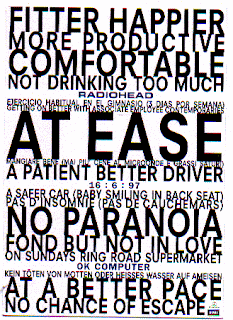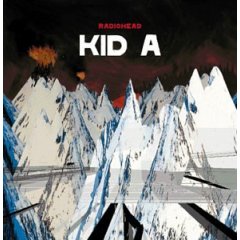Yes, it's a cliche. We've finally reached the point where it's now totally uncool to say that
OK Computer is your favourite record ever. Uber-hipsters are disowning this record faster than Germans dispensed with Nazism in 1945, labelling it 'boring', 'overrated' and 'pretentious' to name but three of the less vitriolic adjectives that have been hurled its way in the music press and amonsgt the public musical intelligentsia of late.

Now I understand the desire to recant a love of a record that received phenomenal hype upon its release, the very essence of being musically literate, conscious and current is obscurity. And hype (and it's evil twin, popularity) is the natural enemy of obscurity. Your favourite Led Zeppelin song can't be
Stairway to Heaven, it has to be
The Lemon Song or (my favourite)
What is And What Should Never Be. Owning up to loving something that is loved not only by millions of people, but millions of people who are unaware of who Nick Drake and Husker Du are, is the very essence of not being cool.
But revisionist history is a very evil thing indeed. Just as I imagine the music world probably turned on
Sgt Peppers in 1977, and definitely turned on
Off the Wall in 1988, ten years after the release of
OK Computer, people decided to get it in their heads that they, and the rest of the world, were wrong after all, and it wasn't that great a record, we simply got carried away because it was WAY different from BritPop and we all loved
The Bends so much.

Well, I feel compelled to disagree. Vehemently. It is not boring. In fact OK Computer is so exciting that even today, nearly 520 weeks after its release, it still sounds current, fresh, imaginative, as I imagine it will continue to do well into the distant future, much as the sprawling reverse flute breakdown at the end of Strawberry Fields Forever will always sound abstract and cool, no matter how many bands copy it and attempt to rob it of its lustre. Some music defies time.
Radiohead had already formed a habit (which continues today) of announcing their intentions with not only the opening track, but the opening bars of the opening track. Witness the empty cold wind of Planet Xerox, the descending keyboard refrain of Everything in its Right Place I or the sound of a guitar plugging into an amplifier on the latest return to guitar rock, Hail to the Thief. On OK Computer, Airbag announced the epic scope to come with a triumphal, soaring guitar riff, leaving no doubt in the listener's mind as to what kind of aural assault they wer in for. Drums loop, guitars squeal, mystery guitar and vocal sounds are cut up and scratched on a turntable, while melopies blend into each other and guitars morph into choirs singing a counterpoint to Thom Yorke's vocals in the final, mindblowing chorus and outro. Anyone who doubts the impact of this record should be challenged to sit in a dark room with headphones on and listen to that song, and not find themselves short of breath by the end. And that's just the opening song. The opening line, 'In the next world war/In a jack-knifed juggernaut/I am born again' recalls a time when lyrics were not only left open to interpretation, but were actively encouraged to be interpreted as the listener saw fit.
An ongoing theme across the record fear of the new, impersonal world being created by the increasing intrusion of computers into our lives, and the social disconnection they create. That the bulk of the album was recorded with the overt asssistance of newly available computer technology, lent the entire work a sense of irony that, in lesser hands, would have seemed churlish. 'Such a pretty house/Such a pretty garden' on No Surprises, or 'The dust/The screaming/The yuppies networking/.../God loves his children, Yeah!' from the schitzophrenic masterpiece, Paranoid Android positively yell this from the rooftops, alternating between sorrowful longing on the former and outright rage on the latter.
Radiohead manage to namedrop Bob Dylan's famous moment when he 'plugged in' on Subterranean Homesick Alien, clearly an indication that the band knew full well how this record was likely to be received. But here's the thing. When the chorus kicks in, with its gradually swelling and ebbing guitar and gorgeously escalating keyboard coda, with Yorke wailing 'Uptight/We're all uptight', none of it really matters. You can't help but be swept along with it all, as with the vitriolic, vituperative and viscious interpretation of Romeo and Juliet, Exit Music (For a Film), where sheer fury and indignation have never sounded so gorgeous.
Clearly there are 11 songs (and a computer-generated poem) on OK Computer, but it doesn't quite seem necessary to discuss them all. They're best left a mystery, on the off chance that someone who is yet to hear them can experience the sheer emotional tsunami that the first (and indeed, tenth and hundredth) listen of OK Computer can create. Right now, the final verse of Let Down is echoing in my headphones, and for the millionth time, I feel moved to tears.
Pretentious? Yes. But who cares, when it's so beautiful. Overrated? Probably. It's widely regarded as the greatest thing ever by alot of people, and clearly there is no one greatest record EVER, but it's my favourite. And don't you ever call it boring.
Labels: All Time Top Ten, OK Computer, Radiohead
 Now I understand the desire to recant a love of a record that received phenomenal hype upon its release, the very essence of being musically literate, conscious and current is obscurity. And hype (and it's evil twin, popularity) is the natural enemy of obscurity. Your favourite Led Zeppelin song can't be Stairway to Heaven, it has to be The Lemon Song or (my favourite) What is And What Should Never Be. Owning up to loving something that is loved not only by millions of people, but millions of people who are unaware of who Nick Drake and Husker Du are, is the very essence of not being cool.
Now I understand the desire to recant a love of a record that received phenomenal hype upon its release, the very essence of being musically literate, conscious and current is obscurity. And hype (and it's evil twin, popularity) is the natural enemy of obscurity. Your favourite Led Zeppelin song can't be Stairway to Heaven, it has to be The Lemon Song or (my favourite) What is And What Should Never Be. Owning up to loving something that is loved not only by millions of people, but millions of people who are unaware of who Nick Drake and Husker Du are, is the very essence of not being cool. 







